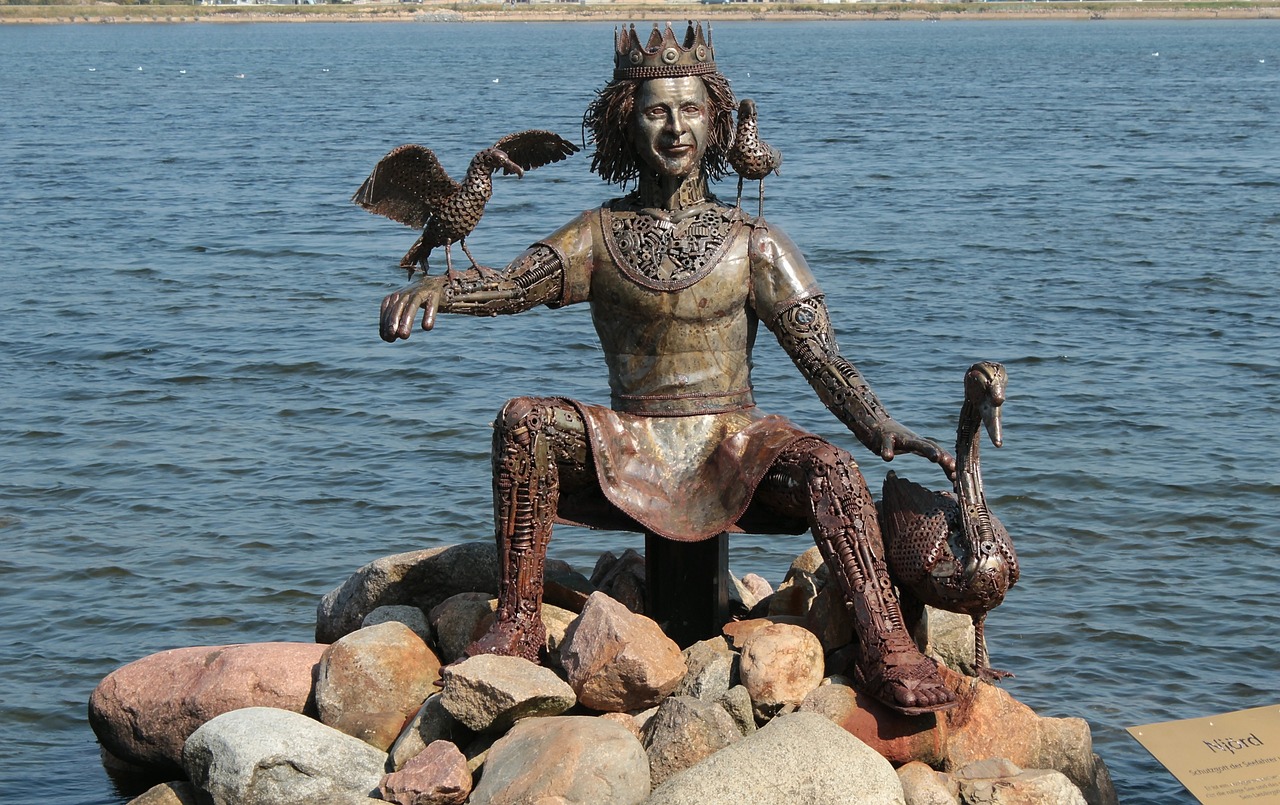In the rich landscape of Norse mythology, where divine figures exert tremendous influence and poignant narratives abound, one name often lurks in the shadow of the more prominent gods, Odin and Thor. This figure is Njord, known in Old Norse as njörðr, a god whose realms encompass the pivotal elements of the sea, wind, and wealth. Despite his significant role, Njord tends to be less recognized outside the knowledgeable circles of Viking history and pagan practices. This writing aims to illuminate Njord’s multifaceted mythology, providing insights that invite a deeper understanding of his importance within the Norse pantheon. Engaging with Njord’s stories, we embark on an exploration that celebrates the depth of Norse mythology while appealing to modern pagans, witchcraft enthusiasts, and those fascinated by Viking culture.
Introduction to Njord
Njord stands out among the Vanir gods, particularly due to his association with nature and the calm amidst an often warlike pantheon. He is a father to Freyr and Freyja, two pivotal figures in Norse theology, underscoring his central role in the divine family structure. Njord’s history is closely tied to the Aesir-Vanir war, marking a crucial moment where he symbolizes peace between warring divine families.
Njord’s Domain
Njord’s identity is attributed to the maritime domain, which was existentially essential to the Norsemen. As a deity of the sea, wind, and wealth, he acts as a protector of those whose lives are significantly intertwined with the ocean. Fishermen and seafarers often called upon Njord for favorable weather and plentiful catches, reflecting the deeply embedded respect the Vikings held for the sea and its capricious nature. Njord’s guardianship signifies the intimate connection between the Norse people and their maritime environment.
Engaging Myths of Njord
One of the most intriguing aspects of Njord’s mythology is his alliance with Skadi, a giantess. The narrative begins with Skadi’s quest for vengeance for her father’s slaying by the gods, prompting her to demand a husband from among them. However, she chose her mate based solely on their feet, believing she was selecting the handsome Baldr, only to find herself wed to Njord. Their union showcases the interplay between Njord’s oceanic domain and Skadi’s affinity for the snowy mountains. Their attempt to merge these starkly contrasting lifestyles reveals the broader theme that love alone cannot bridge inherent differences.
Njord’s Role in the Aesir-Vanir Conflict
Njord’s import in Norse mythology further manifests in the Aesir-Vanir war. As a prominent member of the Vanir, Njord is involved in this decisive conflict, which ultimately settled without clear victory but through a peace treaty that necessitated the exchange of deities between clans. Njord’s learning to navigate the Aesir pantheon, alongside his children Freyr and Freyja, symbolizes the successful merging of two distinct divine ideologies—fertility and valor—reflecting a sophisticated understanding of unity through diversity.
Njord: The Multifaceted Deity
Njord’s identity transcends mere associations with the sea; he embodies wealth, fecundity, and abundance. To the Norse people, wealth wasn’t measured solely by coins but through the richness of land and sea. Njord was revered for ensuring fruitful fishing expeditions, making him a vital figure for any seafaring community. Moreover, his ties to fertility underscore his importance as a deity intimately connected to life and sustenance.
Worship and Influence of Njord
The devotion to Njord encompassed a spectrum of rituals and offerings that mirrored his jurisdiction over land and sea. Coastal communities traditionally honored him in hopes of prosperous sea voyages and fruitful fishing endeavors. Many Scandinavian locations bear names linked to Njord, hinting at the extensive reach of his worship. This reverence is preserved in historical texts like the Prose Edda and Poetic Edda, which portray Njord’s characteristics and mythologies, contributing significantly to understanding the ancient Norse worldview shaped by this deity.
The Legacy of Njord through Literature
Njord’s presence is vividly portrayed across various literary sources, particularly the Eddas, that capture the essence of Norse mythology. These texts not only showcase him as a guardian of wealth but also highlight his swift control over the elemental forces of nature—both nurturing and destructive. In modern interpretations, Njord’s tales are experiencing a revival, resonating with contemporary audiences and inspiring artistic and literary explorations.
The Evolution of Njord’s Mythology
Today, Njord’s imagery and stories have been reinterpreted, finding a place in modern pagan practices and artistic representations. People drawn to nature and the elemental forces often revere Njord within their rituals, linking him to the ancient narratives that emphasize a harmonious relationship with the earth. This contemporary interest reflects an ongoing desire to connect with ancient wisdom and spiritual heritage.
Njord’s Enduring Significance
Njord’s legacy continues to be felt within modern Norse paganism, where he is celebrated for his connections to nature, particularly the sea’s bounty, fertility, and protection. Rituals honoring Njord persist, adapted into modern practices that acknowledge the ancient roots of this veneration. His multifaceted character encourages a broader reevaluation of how we perceive deities in ancient contexts and our present-day practices.
Njord’s Kinship
As the father of Freyr and Freyja, Njord’s divine connections enhance his narrative within Norse mythology. This familial structure communicates the themes of interconnectedness and the importance of lineage among the gods, with Njord representing elements of nature essential for life.
Conclusion
Through exploring Njord’s story, we’ve traversed his familial connections, role in significant myths, and enduring legacy. This journey into Njord’s life invites admirers of Norse mythology to recognize the depths of less celebrated deities. By engaging with these narratives, we not only celebrate the richness of ancient Norse culture but also deepen our relationship with the natural and spiritual elements that have shaped human understanding throughout history.



